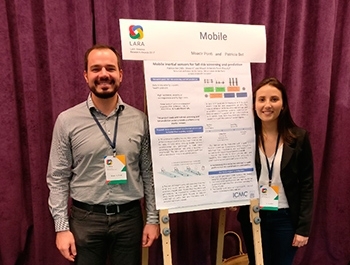

Brazilian academic project that won an award from Google will develop a system with an accelerometer to detect tendencies that could lead elderly people to fall (photo: Patrícia Bet and Moacir Ponti during a presentation on the project at Google’s São Paulo campus/ release)
Brazilian academic project that won an award from Google will develop a system with an accelerometer to detect tendencies that could lead elderly people to fall.
Brazilian academic project that won an award from Google will develop a system with an accelerometer to detect tendencies that could lead elderly people to fall.

Brazilian academic project that won an award from Google will develop a system with an accelerometer to detect tendencies that could lead elderly people to fall (photo: Patrícia Bet and Moacir Ponti during a presentation on the project at Google’s São Paulo campus/ release)
Agência FAPESP – A research project conducted in partnership by the University of São Paulo’s Mathematics & Computer Science Institute (ICMC-USP) and the Gerontology Department of the Federal University of São Carlos (UFSCar) will lead to the development of a product to help older people avoid falls.
The project won a one-year Latin America Research Award from Google in late August 2017.
Falling by older adults is considered a public health problem owing to the severity of the injuries it can cause. There are various methods to help carers and physicians prevent falling, but they typically limit the freedom of the older people involved.
The new project set out to solve this dilemma from a different perspective. An accelerometer – a small device that senses changes in velocity – will be used to detect tendencies that could lead a healthy older person to experience a fall in the near future. The device will be small enough to be built into a wearable device such as a wristband or waistband.
The research was conducted by Patrícia Bet for a master’s degree in gerontology at UFSCar, with supervision by Moacir Ponti, a professor at ICMC-USP, and support from Paula Costa Castro, a professor at UFSCar.
Bet carried out the project as an extension of her scientific initiation with a scholarship from FAPESP.
According to ICMC-USP, one of the advantages of the device is that the existing commercial solutions detect a fall only as or after it happens. The new model can tell whether the person has had one or more falls recently, and this enables predictions to be made regarding the likelihood of future falls.
Testing performed for the USP/UFSCar project established a sample of 74 older people without any falls in the previous six months. The assessment consisted of a socio-demographic questionnaire and a cognitive profile questionnaire covering attention, memory, orientation, naming, following oral and written commands, free sentence composition, and copying a complex figure.
Having completed the tests, the researchers need time to monitor the volunteers and analyze the results. “We plan to call them every three months to find out if they’ve had any falls. At the end, we’ll know who fell in each of these periods,” Ponti said. “Assuming some of the participants will have a fall, we’ll compare their data with the data for those who didn’t fall.”
The final outcome will include the creation of alerts so that carers and physicians can take the necessary steps to prevent falls.
The next goal for the project is the development of a product that collects data continuously and can be worn routinely by any older adult.
Findings from the project have been written up for publication in April in PLOS ONE.
Republish
The Agency FAPESP licenses news via Creative Commons (CC-BY-NC-ND) so that they can be republished free of charge and in a simple way by other digital or printed vehicles. Agência FAPESP must be credited as the source of the content being republished and the name of the reporter (if any) must be attributed. Using the HMTL button below allows compliance with these rules, detailed in Digital Republishing Policy FAPESP.





